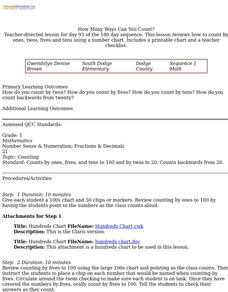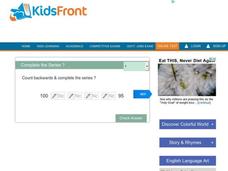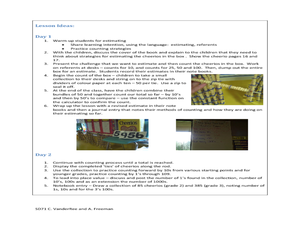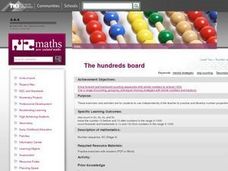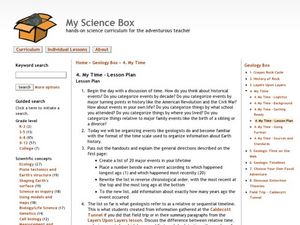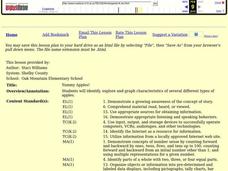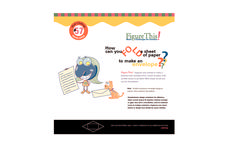Curated OER
How Many Ways Can You Count?
Youngsters chorally count to 100 by 1s, 2s, 5s, and 10s, and backwards from 20, using chip markers and a hundreds chart. Includes a printable chart and a teacher checklist for assessing mastery.
Curated OER
Count Backwards and Complete the Series
In this count backwards worksheet, students count backwards from 100 to 95 and complete the series by filling in the missing numbers. Students fill in 3 missing numbers.
Curated OER
Choral Counting I
Using a 100s chart or a number line with a pointer, work with your class to count up to 100 by ones and tens. As a part of daily instruction, prompt your kindergartners to chant count from 1 to 30. Move on to 1 to 50, and then from 1 to...
Curated OER
Mentally Add and Subtract 10 or 100
Here are some number lines that need to be completed. There are two number sequences, one to test addition skills and the other for subtraction. Both sequences include counting by 10, but the subtracting question has scholars count...
Curated OER
Primary Counting Skills
Class members drill and practice counting skills from 1 to 20. They count along with a puppet and when the puppet makes a mistake, they correct it. In pairs, they connect cubes to make a train and count the number used. On the last of...
Curated OER
Counting Back and Counting On
Read aloud your choice of books about counting on and counting back (a list is provided, or tell stories of your own). Your learners will write horizontal equations to portray what happens in the story. They build a paper chain and...
Curated OER
Counting Back in Tens
In this counting backwards in tens worksheet, 3rd graders count down in tens from 80 to 30, 100 to 50, 110 to 60 and 120 to 70. Students fill in each missing number on each row.
Curated OER
Choral Counting II
Using a number line or a 100s chart that extends past 100, practice counting from 1 to 120 with your class. As a part of daily instruction, chant count in sequence from 1 to 100 and then randomly chose a number and count onward to 120....
Curated OER
Count by 5s, 10s, and 100s
These number sequences are missing digits! Each of the six has one missing number and scholars must figure out what it is. Here's the pattern, though: all of these sequences involve counting by 5s, 10s, and 100s. Learners add one of...
Curated OER
Ten by Ten
Learners participate in hands-on activities using a hundreds chart and counting toes and fingers. They discover the patterns that are created when counting by ten. After a lecture/demo, learners practice by using a worksheet embedded in...
Alabama Learning Exchange
Wheels All Around
Budding mathematicians explore the concept of skip counting. They practice skip counting as they use it to determine the number of wheels that come to school at 3 different times throughout the day. They also create a data graph to show...
Primary National Strategy
Ordering and Counting
Are you in need of a 5-day unit intended to teach little learners how to count to 20? This is a well-structured complete set of lessons which employ a variety of methods to instruct learners about various ways to count from 1 to 20. They...
Curated OER
Counting on Counting
Students recognize that counting tells how many objects are in the set irrespective of how they are arranged or the order in which they are counted. They solve problems involving one more or less to a given set using their knowledge of...
Curated OER
Take Whole Tens: Subtraction with a Number Line
A tens number line helps your class understand how to "hop" backward to subtract by 10's. Ten practice equations are expressed as math sentences (in word form) using the expressions "take __ from __" and "subtract." A little cartoon...
Curated OER
Book Title: Great Estimations
Explore estimation with your math class. They will estimate how many Cheerios are in a box. Then count and group 50 Cheerios on a twist tie and attach groups to represent hundreds. They then discuss and practice skip counting and revise...
Curated OER
The Hundreds Board
Students explore the concept of multiples and use a hundreds board to add numbers and then graph them. Afterward, they use the sieve of Eratosthenes to identify prime numbers and discover how numbers change when you add or subtract by ten.
Curated OER
The Palindromic Year Problem
For this algebra worksheet, 9th graders solve word problems containing palindromic years and count how many plaindromic years there are between 1 AD and the next 100 years.
Curated OER
Teenagers
For this fast-paced activity, learners identify the order of numbers from 13 to 20. They practice greater than and less than with verbal responses to pairs of numbers. Suggested accompaniments include counting forward and backward to 20....
Curated OER
Genes
Fifth graders learn of how genes transfer information from one generation to the next. They flip a penny and circle traits to create an offspring. Next, they will draw a picture using the traits circled with colored pencils on the "Who...
Curated OER
Big Steps
Second graders practice developing strategies for mental calculation when counting in 10s and 100s. They mentally perform calculations involving addition and subtraction to be able to state the difference between numbers by counting in...
Curated OER
My Time!
Learners explore how to tell time by looking at their daily schedule. Everyone's days start out the same (with school), but what does each learner do after school? How do they spend their time?
Alabama Learning Exchange
Triple Addition Shuffle
Get those kids practicing basic math skills. They practice adding 3 numbers together by playing the game "Triple Addition Shuffle." Each pair of learners shuffles number cards together, places them face down, then flips them over to...
Curated OER
Yummy Apples!
Students discuss apples and how they are grown. They listen as the teacher reads "Apples," by Gail Gibbons. Students discuss the story. They view several different types of apples and compare their characteristics. Students taste several...
Curated OER
Math Challenges
Students participate in a series of challenging math lessons designed to engage their critical thinking skills. In these real-world problem solving lessons, student solve symmetry and repeated pattern problems, make lists/tables to...


